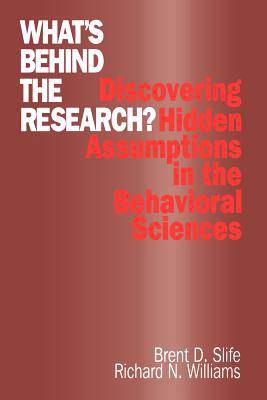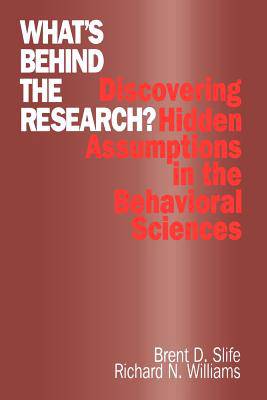
- Retrait gratuit dans votre magasin Club
- 7.000.000 titres dans notre catalogue
- Payer en toute sécurité
- Toujours un magasin près de chez vous
- Retrait gratuit dans votre magasin Club
- 7.000.0000 titres dans notre catalogue
- Payer en toute sécurité
- Toujours un magasin près de chez vous
What's Behind the Research?
Discovering Hidden Assumptions in the Behavioral Sciences
Brent D Slife, Richard N Williams
Livre broché | Anglais
253,45 €
+ 506 points
Description
Aimed at facilitating critical theoretical thinking in the behavioral sciences, What′s Behind the Research? explores the main assumptions that behavioral science theories are based on and offers some alternatives to these assumptions. The book begins with a review of the major theoretical approaches in the behavioral sciences (psychoanalysis, behaviorism, humanism, cognitivism, eclecticism, structuralism, and postmodernism) and examines which assumptions are made versus those that are overlooked in these theories. The next four chapters reveal and discuss the key assumptions of the theories (knowing, determinism, reductionism, and science) by tracing the intellectual history of these conceptions, followed by a presentation of contrasting options. The book concludes with an examination of possible ways to come to terms with some of the inadequacies in the assumptions of the behavioral sciences. Readers will find that this book will enable them to make better choices in doing their research and in critical theoretical thinking.
Praise for What′s Behind the Research?
"Slife and Williams present a compelling and potentially controversial look at the implicit underpinnings of behavioral research. The do an admirable job of specifically describing the ′embedded ideas′ of some of the most commonly accepted behavioral theories. . . . Well written, concise, and well thought out; arguments are made in readable fashion, suitable for scholar and nonscholar alike." --Choice
"The manuscript completely captivated me around the middle of Chapter 2 with ′Eclectic Theories,′ where I began reading with absorption in order to process ideas for myself, instead of reading on the surface to see what the author was about. Again and again I found myself pausing to contemplate provocative one-liners. . . . Throughout, the philosophical inquiry seems to me profound and enchanting, with an original and compelling synthesis." --Maria Arrigo, Psychology Graduate Student, Claremont Graduate School
"These authors have an uncanny ability of identifying, as they would say, ′hidden′ issues and assumptions that permeate the behavioral sciences. The arguments they marshall are most compelling and deserving of serious consideration by devoted professionals, students, or lay persons. Hopefully, with the publication of the book such consideration will at long last be realized." --Jeffrey P. Lindstrom, Fontbonne College, Missouri
"This book will stimulate more dialogue; it is long overdue. Thanks to the lucid writing style, sensible organization, and occasional recapitulations in the text, the book will also be accessible to advanced undergraduates and graduates. I plan to require the book in at least one of my courses." --Allan W. Wicker, Center for Organizational and Behavioral Science, The Claremont Graduate School
"This book is important for cultivating a view of behavioral sciences as something far more important than a collection of techniques for gathering and analyzing data. I would recommend it to my colleagues in educational psychology who teach psychological foundations." --Thomas A. Schwandt, School of Education, Indiana University
"To my mind, the finest feature of this book--at the level of a near miracle--is the author′s clear and engaging explanation of complex, subtle, and counter-intuitive ideas. This amazing pedagogical achievement should stand as an example to philosophers. I am also struck by the author′s affection for the reader. The prose is simple because the author wants to make a real connection with the reader; there is no feeling of condescension for the novice or the commercial market. It is a loving instead of a battering style of philosophical disclosure, which did not occur to the philosophical giants whose works the author mercifully interprets for the reader." --Maria Arrigo, Psychology Graduate Student, Claremont Graduate School
"Each chapter consistently follows a similar outline. Introductions and conclusions genuinely assist the reader, as do references back to earlier segments. Daily life examples bring the text to life. The book is designed to engage the reader. Addressing the root metaphor of each theory is effective. Most issues that concerned me wound up being addressed as I went along (which amazed me given such a short volume written to be understood by undergraduates)." --Constance T. Fischer, Department of Psychology, Duquesne University
Praise for What′s Behind the Research?
"Slife and Williams present a compelling and potentially controversial look at the implicit underpinnings of behavioral research. The do an admirable job of specifically describing the ′embedded ideas′ of some of the most commonly accepted behavioral theories. . . . Well written, concise, and well thought out; arguments are made in readable fashion, suitable for scholar and nonscholar alike." --Choice
"The manuscript completely captivated me around the middle of Chapter 2 with ′Eclectic Theories,′ where I began reading with absorption in order to process ideas for myself, instead of reading on the surface to see what the author was about. Again and again I found myself pausing to contemplate provocative one-liners. . . . Throughout, the philosophical inquiry seems to me profound and enchanting, with an original and compelling synthesis." --Maria Arrigo, Psychology Graduate Student, Claremont Graduate School
"These authors have an uncanny ability of identifying, as they would say, ′hidden′ issues and assumptions that permeate the behavioral sciences. The arguments they marshall are most compelling and deserving of serious consideration by devoted professionals, students, or lay persons. Hopefully, with the publication of the book such consideration will at long last be realized." --Jeffrey P. Lindstrom, Fontbonne College, Missouri
"This book will stimulate more dialogue; it is long overdue. Thanks to the lucid writing style, sensible organization, and occasional recapitulations in the text, the book will also be accessible to advanced undergraduates and graduates. I plan to require the book in at least one of my courses." --Allan W. Wicker, Center for Organizational and Behavioral Science, The Claremont Graduate School
"This book is important for cultivating a view of behavioral sciences as something far more important than a collection of techniques for gathering and analyzing data. I would recommend it to my colleagues in educational psychology who teach psychological foundations." --Thomas A. Schwandt, School of Education, Indiana University
"To my mind, the finest feature of this book--at the level of a near miracle--is the author′s clear and engaging explanation of complex, subtle, and counter-intuitive ideas. This amazing pedagogical achievement should stand as an example to philosophers. I am also struck by the author′s affection for the reader. The prose is simple because the author wants to make a real connection with the reader; there is no feeling of condescension for the novice or the commercial market. It is a loving instead of a battering style of philosophical disclosure, which did not occur to the philosophical giants whose works the author mercifully interprets for the reader." --Maria Arrigo, Psychology Graduate Student, Claremont Graduate School
"Each chapter consistently follows a similar outline. Introductions and conclusions genuinely assist the reader, as do references back to earlier segments. Daily life examples bring the text to life. The book is designed to engage the reader. Addressing the root metaphor of each theory is effective. Most issues that concerned me wound up being addressed as I went along (which amazed me given such a short volume written to be understood by undergraduates)." --Constance T. Fischer, Department of Psychology, Duquesne University
Spécifications
Parties prenantes
- Auteur(s) :
- Editeur:
Contenu
- Nombre de pages :
- 264
- Langue:
- Anglais
Caractéristiques
- EAN:
- 9780803958630
- Date de parution :
- 01-08-95
- Format:
- Livre broché
- Format numérique:
- Trade paperback (VS)
- Dimensions :
- 154 mm x 229 mm
- Poids :
- 408 g

Les avis
Nous publions uniquement les avis qui respectent les conditions requises. Consultez nos conditions pour les avis.






